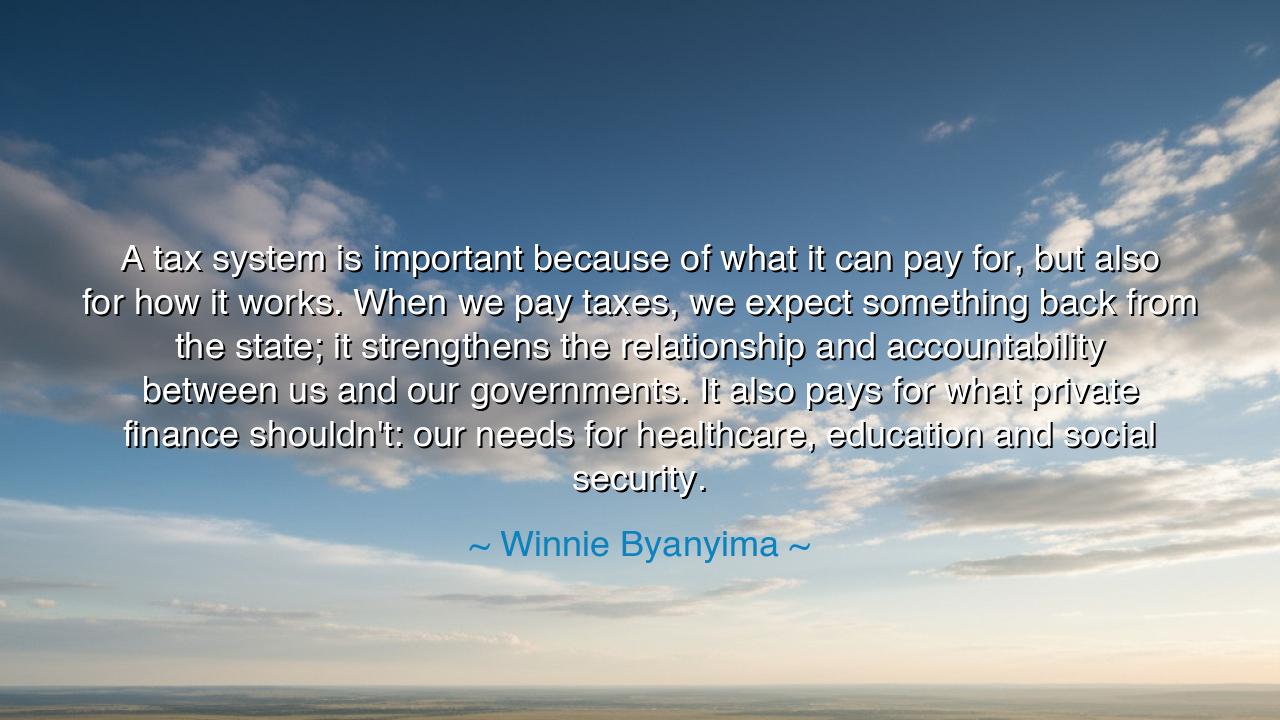
A tax system is important because of what it can pay for, but
A tax system is important because of what it can pay for, but also for how it works. When we pay taxes, we expect something back from the state; it strengthens the relationship and accountability between us and our governments. It also pays for what private finance shouldn't: our needs for healthcare, education and social security.






Hear the words of Winnie Byanyima, a leader and daughter of Africa, who has long spoken for justice and equality: “A tax system is important because of what it can pay for, but also for how it works. When we pay taxes, we expect something back from the state; it strengthens the relationship and accountability between us and our governments. It also pays for what private finance shouldn’t: our needs for healthcare, education and social security. These words rise above politics and speak to the eternal bond between ruler and citizen, between power and responsibility. For here is declared a truth: that a nation is not merely stone and soil, but a covenant of giving and receiving between its people and its leaders.
The tax system is not simply a collection of coins or numbers upon a ledger. It is a mirror of justice. When it is fair, when the burden is shared rightly, and when the treasure it gathers is used for the common good, then it binds a people together in trust. The citizen gives, and in return, the state provides—not as a master giving alms, but as a steward fulfilling its sacred duty. Thus, taxation rightly ordered is not theft but partnership, not punishment but promise.
Byanyima reminds us that accountability lies at the heart of this exchange. When citizens give of their labor in the form of taxes, they do so with expectation: that their government will act as guardian, not exploiter. Roads must be built, schools opened, hospitals supplied, and the weak sheltered. If the rulers squander this wealth, the covenant is broken, and the people grow restless. But when the wealth of the many is returned as service, loyalty is strengthened, and nations flourish.
History testifies to this truth. In ancient Rome, the republic thrived when taxes funded aqueducts, forums, and armies that protected the people. But when emperors grew corrupt, diverting wealth to their own pleasures, resentment swelled, and the empire weakened. In contrast, consider the rise of the Nordic nations in the modern era: through just taxation, they built systems of healthcare, education, and social security that gave dignity to all citizens. These societies became among the most prosperous, not because of greed, but because of shared responsibility and mutual trust.
Byanyima also speaks to what private wealth cannot rightly sustain. The market may build palaces and ships, but it does not care for the sick unless profit is promised. It may open schools for the rich, but leaves the poor in ignorance. It may secure the strong, but abandons the weak. Therefore, she declares that healthcare, education, and social security must be borne by all, through the state, for they are not luxuries but necessities. A just tax system ensures that no child is denied learning, no sick person abandoned, no elder left to despair.
The meaning is clear: taxes are not only about revenue, but about justice, solidarity, and shared destiny. To pay them is not only to give, but to participate in the building of a common life. To collect them fairly and use them wisely is the highest duty of rulers, for it binds the hearts of citizens to their government and turns mere territory into a true nation.
Therefore, O listener, take this lesson into your own heart: do not see taxation only as loss, but as contribution to a greater whole. Demand of your leaders fairness, accountability, and service, for these are the conditions of your trust. Celebrate when your contribution brings schools, hospitals, and protection for the vulnerable. And guard against corruption, for it is the thief of the people’s covenant.
For as Winnie Byanyima declared, a tax system is not only a means of gathering wealth—it is the lifeline of justice, the test of trust, the instrument by which governments prove their worth to the governed. Let your voice be strong, your vigilance steady, and your heart steadfast in the pursuit of a society where every contribution builds a future worthy of all.






AAdministratorAdministrator
Welcome, honored guests. Please leave a comment, we will respond soon